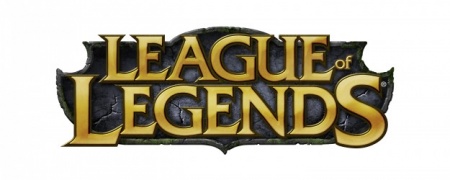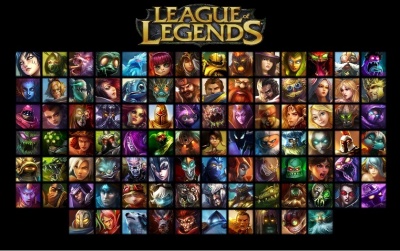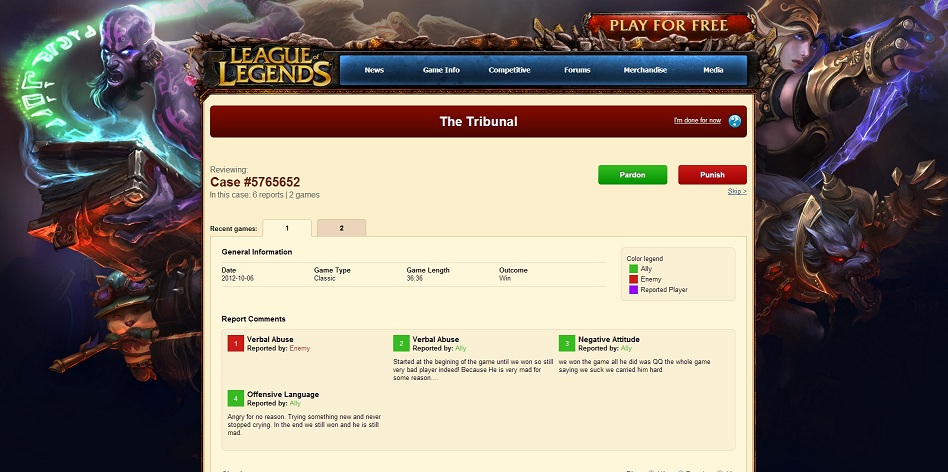League of Legends
League of Legends is a online competitive multiplayer game created by Riot Games. The game was first released on on October 27, 2009 for the Windows platform. The official release date for the Mac version has not yet been determined. Currently, Mac users can enjoy the game through a few unofficial modifications.
Contents
Game Play
General
The game focus strongly on team work and collaboration. Players are divided into 2 teams of 5 or 3 players depending on the gaming mode. Each player controls a "Champion" which are fantasy characters. The team must work together to advance through a series of towers and minions to reach the enemy "Nexus" which signifies a flag in a Capture the Flag game. The Champions gain experience and money when defeating enemy minions, towers, and Champions. The Champion levels up gaining new abilities in each level and the money can be used to purchase new items to increase the stats of the champion. The game ends when one team destroys the other team's Nexus. [1]
The Summoner
A player in League of Legends is also referred to as a summoner. At the end of each game, Summoner will also receive experience points and influence points. The experience points levels up the Summoner's account as a whole, and the influence points can be used to purchase runes and new champions. The Summoner becomes more powerful as he/she collects more champions and runes.
Gaming Etiquette and the Tribunal
Gaming Etiquette
Every player/Summoner who wishes to play league of legends must sign a electronic contract stating that they would adhere to a set of rules call the "Summoner's code." The Summoner's code states clearly what is acceptable gaming behavior and what is not. If a player fails to follow the Summoner's code, he/ she would be at risk of being reported. A player can be reported for the following reasons[2]:
1. Harassment: Offensive Language – Including, but not limited to language that is vulgar, obscene, sexually explicit, or racially, ethnically, or otherwise objectionable.
2. Harassment: Verbal Abuse - Including, but not limited to, language that is unlawful, harmful, threatening, abusive, harassing, defamatory, or otherwise objectionable.
3. Griefing: Intentional Feeding - Purposely dying to enemy champions or turrets to make the opposing team more powerful while putting your team at a disadvantage.
4. Griefing: Assisting Enemy Team – This includes using all-chat or Summoner abilities to assist the opposing team in any way.
5. Unskilled Player - If you feel that a Summoner is not playing well - such as not last hitting, not using the right skills, having the wrong build, and having poor map awareness, you can report that player for being unskilled.
6. Refusing to Communicate with Team – Applies to any Summoner that refuses to use chat or pings.
7. Leaving the Game/AFK - This includes logging out or exiting the Game before a match ends as well as standing idle for long periods of time or refusing to participate in the match at all.
8. Negative Attitude – Any Summoner that is constantly putting other Summoners down or being generally negative about the game.
9. Inappropriate Name – Select this option is you see a Summoner name that is falsely indicative of an association with Riot Games, contains personally identifying information, infringes on the proprietary rights of third parties, or that is offensive, defamatory, vulgar, obscene, sexually explicit, racially, ethnically, or otherwise objectionable. This also applies if the name uses a misspelling or an alternative spelling to circumvent this restriction on Summoner name choices.
10. Spamming - Whether for personal or commercial purposes, by disrupting the flow of conversation with repeated postings of a similar nature is a reportable offense.
After a player has been reported by another player, the case would be put on trial on the tribunal.
The Tribunal
Any experienced player (players above level 20) can participate in the tribunal. The player would review a case and determine if the player in question deserves to be punished. The tribunal would show the information of the games the players are being reported in. Below is a example of a case being reviewed.
After reviewing the chat log, game statistics, and inputs from the players of the game, the player can vote to either pardon or punish the reported player. A case is reviewed by multiple players to ensure a fair judgement. A timer is also added to the right of the page so that each case gets sufficient time to be reviewed before a player makes a decision. Riot Games rewards players who make the right judgment on a case through extra game points. Punishing every player who gets reported would not make the system reward the player more. Players get rewarded by making the right judgment base on the 10 rules above. Players who are punished by the tribunal are banned from playing. Players are banned for different duration depending on the seriousness of the offense, number of times reported, and previous punishment. The duration of bans ranges from a day to a month.
Player Rating
League of Legends recently developed a feedback system for players to rate other players after each games. This rating system is called the Honors Initiative and it consists of 4 different ratings which are "Friendly", "Helpful", "Teamwork", and "Honorable." These ratings are used as a way for players to gauge the playing habits of other players. If a player has been friendly or helpful to another player, the player can have the option to add a point to the other player's rating. Although the ratings do not affect how the game plays and have no incentive if one has a lot of them, they signifies the player's reputation. Riot Games developed this rating system as a way to reward players for good behavior. After the system has implemented, there has been significant improvement in the quality of the games. [3] Below are the results of after one week of implementing the system.
Negative Attitude reports: -29% in normals games and -11% in ranked games
Offensive Language reports: -35% in normals games and -20% in ranked games
Verbal Abuse reports: -41% in normals games -17% in ranked games
The improved game play due to the Honor Initiative is truly remarkable. The system promotes good gaming etiquette through a rating system that doesn't interfere with the actual game play. Players naturally want to collect these honor points to be reputable. Riot Games also implemented bots that routinely checks for players that trade honor points(Giving points to other player for no other reason than to receive points back) , making it difficult for players to accumulate honor points through unconventional methods.[4]
Ethical Issues
Delayed Punishment
One of the biggest problem of the Tribunal is that it is a delayed punishment system. Players who are reported due to poor gaming etiquette are not punished immediately. Players can continue to play games and behave poorly after being reported. A case might not be reviewed until there are multiple reports and incidents. This delayed punishment is clearly evident when a case is reviewed. When a player is put on the Tribunal, almost certainly there's a pattern of poor game play in not just one but multiple games. Players can avoid being put on the tribunal by playing some games well and other games poorly, making it difficult to pinpoint unethical gaming behavior.[5]
"Smurfing"
League of Legends is a free to play game. Anyone with an email account can apply for an account and play. Players who are banned from one account can just create another one to play. Officially Riot Games does not have any rules or regulations against such behavior. Theoretically, players can create as many accounts as they please, play on one until it gets banned and move on to another one. "Smurfing" becomes a concern since players at a certain skill level may create a new account and play players at the default player rating who tend to be less skilled players. This ruins the experience of new gamers who are trying to learn how to play the game because these "smurfers" have higher skill levels than the new account(s) they are hiding under. The "smurfers" have the benefits of beating lower skilled players which cause ethical issues to a growing League of Legends community as this can be discouraging for new players.


